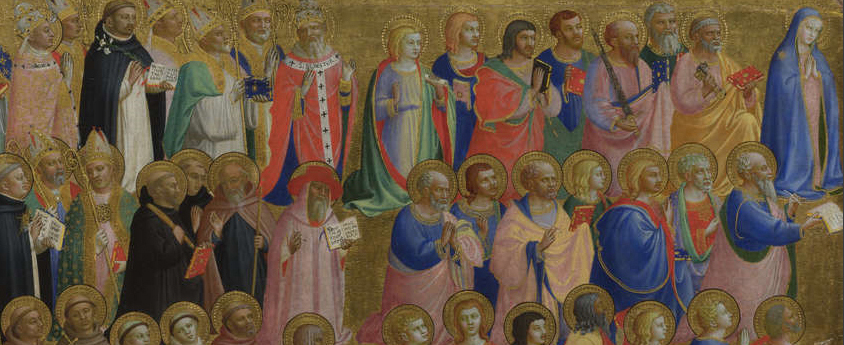“Every so often, unite oneself interiorly with the saintly souls who serve God and praise him in their solitude, with the holy angels and all the heavenly court, and especially our darling and tender Mother Mary, who alone gives more glory to God than all the blessed put together.” (St. Eugène de Mazenod)
We believe that the Blessed Virgin Mary and the saints in heaven “contemplate God, praise him and constantly care for those whom they have left on earth. … Their intercession is their most exalted service in God’s plan” (Catechism of the Catholic Church, No. 2683). Just as we would never hesitate to ask a friend or relative for prayer support in a time of need, so we should not hesitate to prayerfully ask the Blessed Mother and the saints to bring our needs before God.
The Council of Trent affirmed “that the saints who reign together with Christ offer up their prayers to God for men, that it is good and beneficial suppliantly to invoke them and to have recourse to their prayers, assistance and support in order to obtain favors from God through His Son, Jesus Christ our Lord, who alone is our redeemer and savior.” The saints and Mary cannot answer our prayers; only God can do that. But they can, and we believe they do, hear our prayers and pray for us, acting as intercessors on our behalf with God.
Eucharistic Prayer III reminds us of the saints’ role as intercessors. “May he make of us an eternal offering to you, so that we may obtain an inheritance with your elect, especially with the most Blessed Virgin Mary, Mother of God, with blessed Joseph, her Spouse, with your blessed Apostles and glorious Martyrs and with all the Saints, on whose constant intercession in your presence we rely for unfailing help.”
“To Jesus we always go, and to him we always return, through Mary” St. Josemaría Escrivá wrote. In the Gospel of John, we see the first example of Mary’s intercession at the Wedding at Cana (Jn 2:1-11), when Mary noticed that the wine had run out before the party was over and prodded Jesus to do something about it. By changing the water in six stone jars to wine, Jesus “revealed his glory” and astounded all who were present (Jn 2:11). Since that time, Catholics have gone to Jesus through Mary. “O Blessed Mary, whoever loves you honors God; whoever serves you pleases God; whoever invokes your holy name with a pure heart will infallibly receive the object of his petition,” St. Bernard of Clairvaux prayed. In a similar way, people of faith have reached out in prayer to the saints, pleading with them to bring their intentions to God by their own prayer.
Praying to Mary and the saints is not at all the same as worshipping them. Catholics believe that only God is worthy of our worship. Mary and the saints, however, are worthy of veneration, or special honor given to those considered to be holy. Our holy helpers, the saints, are the “cloud of witnesses” mentioned in the Letter to the Hebrews who surround us, helping us “persevere in running the race that lies before us while keeping our eyes fixed on Jesus, the leader and perfecter of faith” (12:1-2). St. Thérèse of Lisieux proclaimed, “I want to spend my Heaven doing good on earth.”
With several thousand canonized saints, we can go a lifetime without getting to know them all. We often come to know particular saints because they are patron saints: a certain place, profession, condition or intention is dedicated to that saint’s intercession. Many times, this happens because of some connection in the saint’s real life. For example, St. Lucy’s eyes were plucked out during her martyrdom, and she is venerated as the patron saint of the visually impaired. St. Joseph, the foster father of Jesus, is the patron saint of fathers and of the universal Church (among many other patronages).
We can grow closer to the saints for whom we were named or who have an association to our jobs, home country or health needs. We can also choose to unite ourselves in prayer with saints who have undergone struggles similar to our own. Parents whose children have strayed from the Faith often seek the intercession of St. Monica, who prayed for decades that her son, Augustine, would return to the Church — and whose prayers were finally answered. Those grieving the loss of their own parents might pray for the intercession of St. Elizabeth of the Trinity, whose father died when she was a small child. The Blessed Mother’s intercession can be invoked for many reasons. Some of her many titles suggest ways people of faith have sought her prayers throughout history: Our Lady, Health of the Sick; Mary, Help of Christians; Our Lady of Good Help; Our Lady of Prompt Succor and Our Lady of Perpetual Help.
By uniting our prayers with those of Mary and the saints and learning more about their lives and their example, we can draw closer to God. “The very practice of venerating the saints does great good for those who are devoted to the saints. By practicing love of the saints we strengthen the unity of the entire Body of Christ in the Spirit” (United States Conference of Catholic Bishops).
Barb Szyszkiewicz, a Secular Franciscan, is editor at CatholicMom.com and author of “The Handy Little Guide to Prayer” (OSV, $5.95). Read more from the prayer series here.

